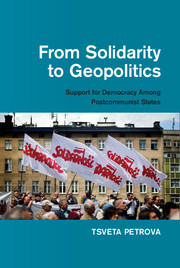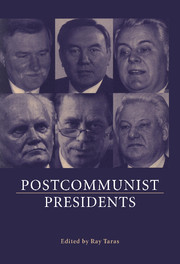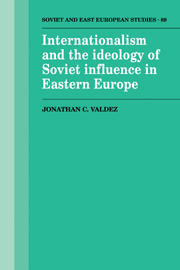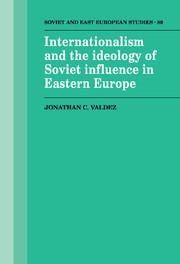From Solidarity to Geopolitics
This book theorizes a mechanism underlying regime-change waves, the deliberate efforts of diffusion entrepreneurs to spread a particular regime and regime-change model across state borders. Why do only certain states and nonstate actors emerge as such entrepreneurs? Why, how, and how effectively do they support regime change abroad? To answer these questions, the book studies the entrepreneurs behind the third wave of democratization, with a focus on the new eastern European democracies – members of the European Union. The study finds that it is not the strongest democracies nor the democracies trying to ensure their survival in a neighborhood of nondemocracies that become the most active diffusion entrepreneurs. It is, instead, the countries where the organizers of the domestic democratic transitions build strong solidarity movements supporting the spread of democracy abroad that do. The book also draws parallels between their activism abroad and their experiences with democratization and democracy assistance at home.
- Represents a new direction in the study of Western democracy assistance by focusing on the role of new democracies that were former recipients of such assistance in promoting democratic change abroad
- Adds agents and their motivations and innovations to the literature on the diffusion of democracy
- Draws parallels between democracy promotion abroad and democratization experiences and democratic assistance at home
- Emphasizes the role of non-Western actors in the propagation and future of the liberal norms that are foundational to the current international order
Reviews & endorsements
"In this original and thought-provoking study, Tsveta Petrova demonstrates how mobilized democratic transition from below in Eastern Europe fostered the emergence of a new generation of democracy promoters in the region. In doing so, she provides new insights into transnational diffusion processes and the linkages between the foreign and domestic dimensions of democracy promotion."
Mark R. Beissinger, Henry W. Putnam Professor of Politics, Princeton University, and Director, Princeton Institute for International and Regional Studies
"A masterful study of a critical yet understudied new area of international democracy support. With notable clarity and rigor, Petrova advances innovative, persuasive ideas about the motivations, methods, and impact of the external democracy work by Eastern European countries. A field-defining work that will stand as a benchmark on the topic for years."
Thomas Carothers, Carnegie Endowment for International Peace
"What Tsveta Petrova carefully documents will surprise many: new democracies often do more than old ones to spread democracy internationally. What is more, Petrova's meticulous use of hundreds of interviews in Eastern Europe shows that pro-democracy activists, linked to transnational networks, do much of the work – both in directly promoting liberalism and popular rule, and in pressing their governments to do the same – and that they do it in part to entrench democracy in their own countries."
John Owen, Henry Taylor Professor of Politics, University of Virginia
"The emergence of Third Wave democracies as providers of democracy assistance is increasingly visible, but still has not received the scholarly attention that it merits. Tsveta Petrova's thoughtful comparative study of postcommunist Eastern Europe helps to fill this gap. It not only illuminates how and why some postcommunist states have become enthusiastic supporters of democracy beyond their borders, but also yields a number of broader insights about the enterprise of democracy promotion."
Marc F. Plattner, Editor, Journal of Democracy
"Tsveta Petrova has written an elegant and impressively thorough account of the democracy promotion activities of Central and Eastern European states. The book provides sophisticated explanations for these countries' evolving foreign policies and is astute in revealing the idealistic, but also geostrategic, prompts to East European democracy support. Petrova's analysis is convincingly sympathetic to these member states' efforts to further democratic norms, while also recognizing their shortcomings. The book offers illuminating background that helps shed light on European reactions to the current uncertainty in Ukraine and other Eastern Partnership countries."
Richard Youngs, Carnegie Endowment for International Peace, and Warwick University
Product details
September 2014Hardback
9781107049987
232 pages
235 × 156 × 18 mm
0.44kg
3 b/w illus. 17 tables
Available
Table of Contents
- 1. Regime-change waves and eastern EU democracy promotion
- 2. Exporting the revolution: why only some eastern EU new democracies support democratization abroad
- 3. From solidarity to survival: the motivations behind eastern EU civic democracy promotion
- 4. An improved domestic and international order?: The rationales behind eastern EU official democracy promotion
- 5. A new generation of democracy promoters?: Eastern EU approaches to democracy promotion
- 6. Conclusion: making a difference?










